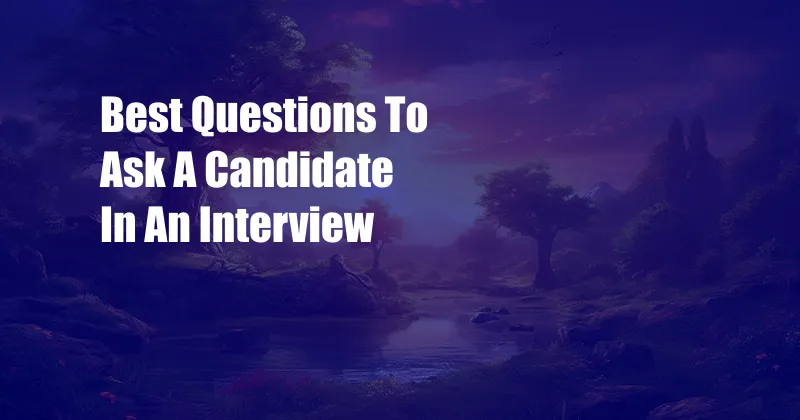
The Art of Interviewing: Unlocking Success Through Thoughtful Questions
Interviewing candidates can be both exhilarating and daunting. As a seasoned recruiter, I’ve witnessed firsthand the profound impact that well-crafted questions can have on uncovering a candidate’s true potential. The secret lies in understanding their motivations, values, and abilities. It’s not just about ticking off questions from a checklist; it’s about delving into their world, unearthing their unique perspectives, and gauging their alignment with your team’s culture.
Before diving into the nitty-gritty of best practices, let’s explore the transformative power of questions. Questions have the ability to illuminate hidden strengths, reveal unspoken weaknesses, and inspire newfound self-awareness. They can unveil a candidate’s passions, fears, and aspirations, allowing you to make informed decisions that will ultimately benefit both the organization and the candidate.
The Power of Open-Ended Questions
Open-ended questions are the magic bullets of interviewing. They grant candidates the freedom to expand on their thoughts, providing a window into their thought processes and problem-solving abilities. Unlike closed-ended questions that elicit one-word answers, open-ended questions invite elaboration, encouraging candidates to delve into their experiences and demonstrate their critical thinking skills.
Using open-ended questions not only uncovers a wealth of information but also fosters a collaborative atmosphere. By asking “Tell me about a time when you faced a challenging situation” instead of “Did you ever face a challenge?” you create a space for candidates to share their stories, providing you with valuable insights into their coping mechanisms, resilience, and problem-solving strategies.
Essential Questions for a Comprehensive Interview
A comprehensive interview should encompass a range of questions that cover a candidate’s technical skills, problem-solving abilities, and cultural fit. Here’s a curated list of essential questions that will help you delve deeper into each aspect:
- Technical Expertise: “Describe your experience with developing and implementing [specific technology or skill].”
- Problem-Solving: “Walk me through a time when you faced a complex problem at work. How did you approach it and what was the outcome?”
- Communication: “Tell me about a time when you had to communicate a complex idea to a non-technical audience.”
- Teamwork: “Describe your experiences working on a team. What role did you play and how did you contribute to the team’s success?”
- Motivation: “What are your career goals and how does this position align with your long-term aspirations?”
Trending Questions for an Up-to-Date Interview
To keep your interviewing skills sharp, stay abreast of the latest trends and developments in the industry. Here are some trending questions that will help you uncover the future-ready candidates:
- Data Analytics: “How would you use data analysis to improve our current business operations?”
- Agile Methodology: “Describe your experience with Agile development methodologies and how you adapt to changing project requirements.”
- Artificial Intelligence (AI): “How do you see AI impacting your role and the industry in the coming years?”
- Sustainability: “What measures have you taken or would you like to take to promote sustainability in the workplace?”
Expert Tips for Maximizing Interview Outcomes
Drawing from my years of experience, here are some expert tips to help you maximize the effectiveness of your interviews:
- Prepare Thoroughly: Research the job description, the company, and the candidate’s background. This will help you ask informed questions tailored to the specific role.
- Create a Positive and Professional Environment: Greet the candidate warmly, make eye contact, and maintain a respectful tone throughout the interview.
- Listen Actively: Pay attention to both verbal and non-verbal cues. Ask clarifying questions and demonstrate that you’re genuinely interested in what the candidate has to say.
- Follow Up Promptly: Thank the candidate for their time, regardless of the outcome. Provide feedback within a reasonable timeframe, even if the candidate is not selected.
FAQs on the Art of Interviewing
Here’s a quick Q&A to address some frequently asked questions about the art of interviewing:
- Q: What is the most important question to ask a job candidate?
- A: There is no single most important question, but a combination of questions tailored to the specific role and the candidate’s background is essential.
- Q: How can I tell if a candidate is being honest in an interview?
- A: Pay attention to non-verbal cues, such as eye contact, body language, and speech patterns. Ask follow-up questions to clarify any inconsistencies in their answers.
- Q: What should I do if a candidate asks me a difficult question?
- A: Be honest and transparent. If you don’t know the answer, admit it and offer to find out. Remember, the interview is a two-way street.
Conclusion
Unlocking the true potential of candidates lies in the power of well-crafted questions. By embracing open-ended questions, exploring trending topics, and incorporating expert tips, you can conduct interviews that yield valuable insights, foster meaningful connections, and ultimately make informed hiring decisions. Remember, the art of interviewing is an ongoing journey; continuous learning and an open mind will help you stay ahead in the ever-changing landscape of talent acquisition.
Do you find the topic of interviewing intriguing? Share your thoughts or experiences with us in the comments below. Your insights can contribute to enriching the knowledge of our community, empowering us all to become more effective interviewers.